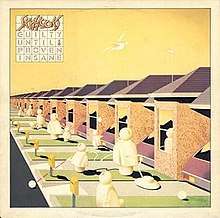Guilty Until Proven Insane
Guilty Until Proven Insane is the fourth studio album released by Skyhooks on March 13, 1978.[1] It was the first album that featured Bob Spencer, who replaced guitarist Red Symons in early 1977. Spencer originally played in Sydney rock band Finch and was later was a member of The Angels.
| Guilty Until Proven Insane | ||||
|---|---|---|---|---|
 | ||||
| Studio album by | ||||
| Released | March 13, 1978 | |||
| Recorded | Armstrong Studios, Melbourne and Trafalgar Studios, Sydney | |||
| Genre | Glam rock | |||
| Length | 38:38 | |||
| Label | Mushroom | |||
| Producer | Eddie Leonetti | |||
| Skyhooks chronology | ||||
| ||||
| Singles from Guilty Until Proven Insane | ||||
| ||||
Details
The album's name comes from a line in "Twisted Innocence", which states 'if I'm guilty until proven insane...' Originally released as a 12" vinyl LP and also on red vinyl as a 5000-copy limited release.. It is the first album to include an uncensored version of "Why Dontcha All Get Fucked" recorded in a studio, as opposed to live and censored versions. It is also the last album vocalist Graeme "Shirley" Strachan made with Skyhooks before reuniting with them for the recording sessions featured on The Lost Album.
In April 1979, 350 copies of the album were seized by Victorian vice squad detectives. Senior Constable John Challis said, "The record in question was by the Skyhooks called "Guilty Until Proven Insane" and one song was suspected of being obscene."[2]
Only two singles were released from the album. "Women in Uniform" was a Top 10 hit nationwide, while "Megalomania" peaked at number 93. The sixth track in the album, "Hotel Hell", was used on the FOX reality series Hotel Hell starring Gordon Ramsay.
Reception
Reviewed at the time of release, Roadrunner said, "I'm afraid to say it's a really patchy affair. Apart from the cracking "Women in Uniform" the album lacks the sparkle and wit of the stage act and the previous albums. I only hope Greg Macainsh goes back to writing songs about Australia. No one does it better."[3]
Rip It Up said, "Like the Rolling Stones, Skyhooks still feel something of an obligation to be outrageous but they remain as strikingly original as when they first began."[4]
Track listing
| No. | Title | Writer(s) | Length |
|---|---|---|---|
| 1. | "Women in Uniform" | Greg Macainsh | 4:21 |
| 2. | "Life in the Modern World" | Macainsh | 3:23 |
| 3. | "Trouble With the Computer" | Macainsh | 4:53 |
| 4. | "BBBBBBBBBBBBBoogie" | Imants "Freddie" Strauks | 3:00 |
| 5. | "Twisted Innocence" | Macainsh | 3:46 |
| No. | Title | Writer(s) | Length |
|---|---|---|---|
| 1. | "Hotel Hell" | Macainsh | 4:46 |
| 2. | "Point in the Distance" | Macainsh | 6:23 |
| 3. | "Meglomania" | Macainsh | 4:07 |
| 4. | "Why Dontcha All Get Fucked" | Macainsh | 3:59 |
Charts
| Chart (1978) | Peak position |
|---|---|
| Australian Kent Music Report Albums Chart[5] | 7 |
Personnel
- Graeme "Shirley" Strachan - Lead Vocals
- Bob Spencer - Guitar, Backing Vocals
- Bob "Bongo" Starkie - Guitar
- Greg Macainsh - bass guitar, narration
- Imants "Freddy" Strauks - Drums, Percussion, Backing Vocals
Additional personnel
- Joe Camilleri (Courtesy OZ Records), Wilbur Wilde - saxophones on "Hotel Hell"
- Tony Ansell - piano on '"Why Dontcha All Get Fucked"; organ on "Meglomania"
- Eddie "Spag" Leonetti - organ on "Twisted Innocence"; string machine on "Point in the Distance"
References
- "Skyhooks - Guilty Until Proven Insane (1978) + Bonus Tracks". Rock On Vinyl. Retrieved 9 July 2011.
- "Skyhooks' records seized". The Canberra Times.
- Donald Robertson (May 1978). "Albums". Roadrunner. pp. 32–33.
- Jeremy Templer (1 August 1978). "Ocker Rockers". Rip It Up. No. 14.
- Kent, David (1993). Australian Chart Book 1970–1992. St Ives, NSW: Australian Chart Book Ltd. ISBN 0-646-11917-6. NOTE: Used for Australian Singles and Albums charting from 1974 until ARIA created their own charts in mid-1988. In 1992, Kent back calculated chart positions for 1970–1974.